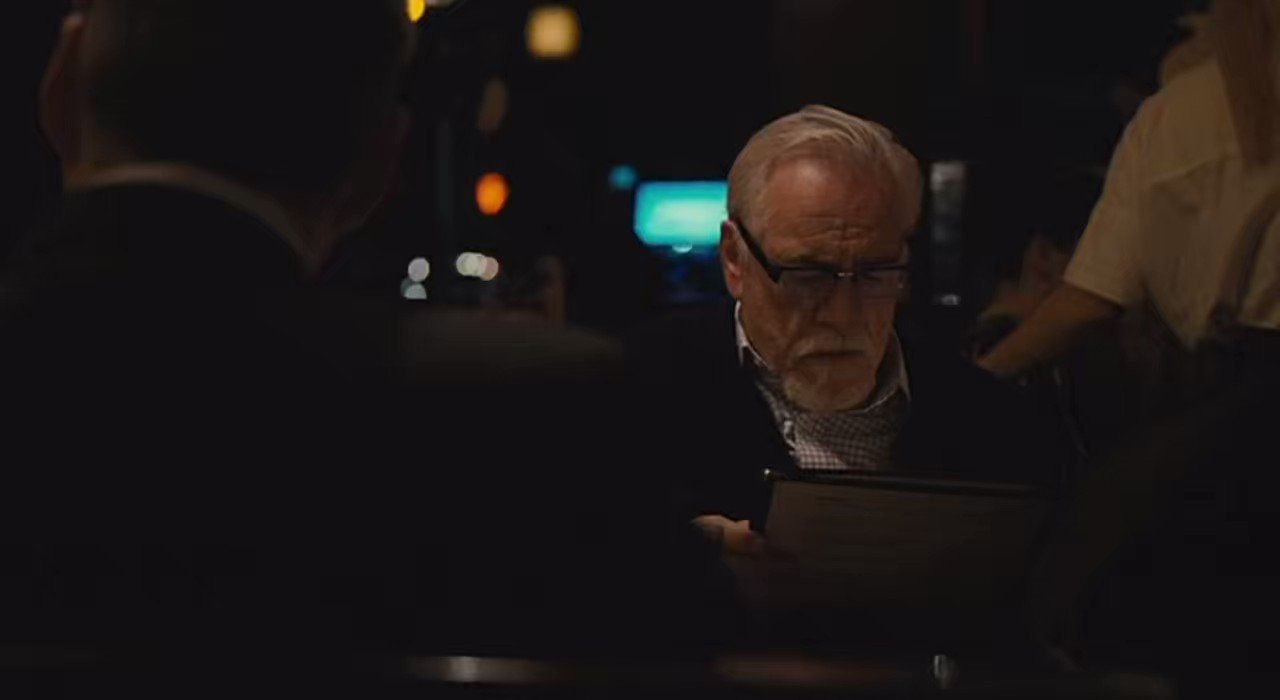Bleary-eyed after staying up too late to binge the last two episodes of Succession and then staying up even later to consume the New York Times’s commentary on them; Alexis Soloski asks “Why Did We Care?” (this seems to summarize my wife’s feelings about the show) while a number of other articles speculate about the show’s costumes, investigate the candle-shopping habits of an actress who played a comparatively minor character, and tell readers just how much the apartments that stood in for the habitats of two of the fictional Roy siblings actually cost. The smartest thing I’ve read about Succession from the Times is Kurt Andersen’s op-ed, which argues that the show’s importance stems from its navigation of the uncanny valley between the events of the Waystarverse and our own world. Jesse Armstrong, the show’s creator, rendered vividly the most salient truth of American life today: the sway that fantasy, disinformation, and alternative facts have over us, whether you consider yourself a member of the reality-based community or subscribe to whatever ideological fantasy is being pushed by your media organ of choice. Or even, the show seems to suggest, if you consider yourself to be “smart”—that is, as cynical as Roman Roy pretends to be on the night of the potential election of a smartly-groomed mini-Hitler that he helped to engineer: “Nothing happens,” he tells his siblings, who have just enough scraps of conscience left to be appalled. “We just made a night of good TV.”
It does seem that, the closer we impinge on the hard boundary of the limits of what we can do to our environment (to the point that the orcas are now in open rebellion) without causing an equal-and-opposite reaction—the greater the pressure of physical reality, which is to say fucking physics—the more intensely we are persuaded by our media- and machine-assisted fantasies, which scale from the pop-culture behemoths of Marvel and Succession down to YouTubers and podcast bros. There doesn’t even seem to be much of a political valence to this tendency, except insofar as the right’s infosphere is its primary source of entertainment, given that you can only watch so many spinoffs of Yellowstone in a given week. Succession, which is produced by and and for the vaguely left mediasphere, is basically The West Wing stood on its head: a fantasy of the incompetence of the billionaire class, in which the intelligence of the Roy siblings’ snappy banter highlights their inability to square the Logan Roy circle of being and doing. When they try to do something, they lose their identities: Shiv sheds her supposed liberal principles, Kendall collapses reeling into a pile of slogans and outright denial, Roman—well, we’ll get to Roman. But they can’t just sit back and enjoy their inherited wealth and simply be, either. They are the equals-and-opposites of the characters on The West Wing, whose verbal intelligence and constant motion supported the show’s fantasy of good-hearted supremely competent vaguely liberal technocrats steering the ship of state, oblivious to the blowback that was about to dissolve the Clinton/New Labour paradise.
On Succession, and many of the other TV shows that have held our attention and earned the highest praise in the post-2016 years, there is only one force capable of punching through the invulnerable skin of ideological fantasy, and that is grief. (I’m thinking of Fleabag and WandaVision and BoJack Horseman and even Ted Lasso, all of which elevate grief to create their self-conscious alternatives to the white-male antihero trend in prestige TV.) From the moment Roman Roy utters the immortal phrase, “I’ve maybe pre-grieved,” viewers are primed for the meltdown to come. The penultimate episode, “Church and State,” begins and ends with the most volatile and most vulnerable of the Roy siblings; after psyching himself up to deliver his father’s eulogy, he is undone by the bleak sincerity of his uncle’s speech. The cynical armor he wears is pierced by Ewan Roy’s devastating memories of the suffering he and Logan endured as child refugees, unearthing the limitless grief he thought he’d somehow skipped, like the queue outside an exclusive restaurant. At the end of the episode he tries to purge his grief through violence, hurtling his frail body at the protesters against the “Nazi-curious” presidential candidate that he worked so hard to elevate. It doesn’t work, and he retreats to the shallow bosom of his appalling mother, where his siblings find him and renew one last time their compact to take control of their dead father’s empire, this time with Kendall at the helm.
Spoiler alert: it doesn’t work. And it’s not just because, as one commenter put it, the only thing Shiv wants more than winning is for her brother Kendall to lose. Roman, the baby of the family who has always reveled in being a transgressive shit-stirrer and teller of uncomfortable truths, tells his siblings and himself that they and their machinations add up to nothing more than “bullshit.” Their efforts to imitate their father’s titanic acts of self-creation are doomed to fail, because they are so completely his creatures: “I love you, but you are not serious people.” It’s important, I think, that the imperial reality of Logan Roy emerged from the crucible of World War II, which has become in modern memory not just the foundation of the Greatest Generation but a synecdoche for history itself, and for the twenty-five year period of economic growth that followed it, which established the grounds of the fantasy of unlimited abundance (and the equal-and-opposite fantasy of communists and immigrants coming to take that abundance away), the fumes of which we’ve all been smoking since Ronald Reagan came to power. The Roys grieve for daddy, but also for the conditions that made daddy possible and which will never be available to them. Daddy made things happen. The best the younger Roys can offer is a night of good TV.
Grief transforms Roman Roy from a performative “guy who tells it like it is” into a genuine truth teller. His breaking point seems to be Kendall’s shocking attempt to lie about the death of the waiter he was responsible for at the end of Season 1—to undo the confession that renewed his bond with Roman and Shiv at the end of Season 3. Roman may say that he’s pre-grieved, but in the end only he seems capable of going through grief to find the truths it has to tell. Shiv retreats into the unlovely cocoon of her marriage to the parochial and striving Tom, whose victory is surely a pyrrhic one—he’ll be the same insecure lickspittle with Mattson as he was with Logan, while dealing out unlimited cruelty to his underlings, starting with Cousin Greg. (I really did think for a minute that Mattson was going to make Greg CEO, but that would have meant the show had gone the full Iannucci at its end.) As for Kendall, he’s an empty shell, sitting staring at the water, watched over enigmatically by the same bodyguard to whom Logan had made the closest thing to a profession of faith. We can’t know, he said, what happens after death, but: “I’ve got my suspicions. I’ve got my fucking suspicions!”
The only force more powerful than grief in our culture may be boredom. Biden’s boringness enabled him to wrest the presidency from the Showman-in-Chief and may yet preserve what’s left of the Republic in 2024. Competence is boring. Our best bet at averting disaster in what’s left of the century may boil down to things getting just interesting enough to show us how much more dire they could be; Russia’s invasion of Ukraine, for example, has done much to stiffen the spine of Western democrats. The real work of averting disaster and bettering the world seems to resist our available models of narrative. I spoke last night with an acquaintance who works in environmental education and who’s helping the scientists who study the African Great Lakes to influence policymakers to care for their ecological well-being. I can’t imagine more important work, and it must have its rhetorical dimension; so much depends today on the ability and willingness of scientists to tell persuasive stories about their work. But I have trouble envisioning a hit TV show built around these people! Maybe that’s a limitation of my imagination; maybe it would be worth trying. When I look around my actual community, I see the helpers Fred Rogers spoke of. When I look at the screens, I see the world Logan Roy created, the one that feeds a certain meagerness in men.







